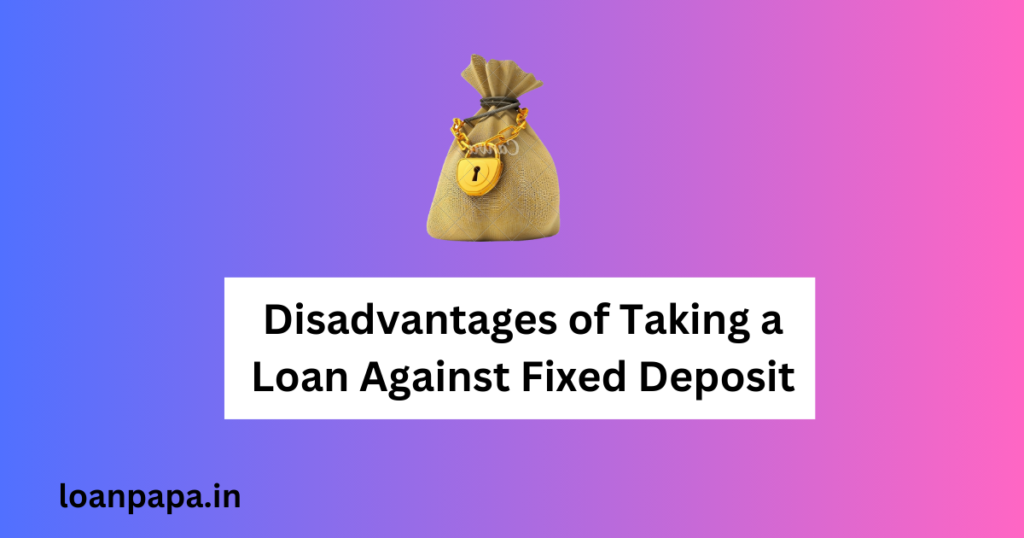
Loan Against Fixed Deposit Disadvantages
Loan Against Fixed Deposit Disadvantages: In India, a loan against fixed deposit (FD) is a popular option for individuals seeking quick access to funds without breaking their FD prematurely. While it offers several advantages, there are also significant disadvantages to consider. This article explores the drawbacks of opting for a loan against fixed deposit in India.
- Interest Rate Differential: When you take a loan against your FD, the interest rate charged by the lender is typically higher than the interest earned on the FD itself. This interest rate differential can result in increased borrowing costs over the tenure of the loan. While the interest on the FD continues to accrue, the borrower must also pay interest on the loan amount, leading to a double financial burden.
- Impact on Returns: By taking a loan against your FD, you essentially reduce the principal amount on which interest is calculated. This diminishes the overall returns on your FD investment. Since the interest earned on the FD may be lower than the interest payable on the loan, the net returns may not justify the decision to borrow against the FD.
- Limited Loan Amount: The maximum loan amount you can avail against your FD is typically a percentage of the total value of the deposit. This means that if you require a substantial amount of funds, a loan against FD may not suffice. In such cases, individuals may need to explore alternative borrowing options, which could potentially offer higher loan amounts.
- Risk of Default: In the event of default on the loan repayment, the lender has the right to liquidate the FD to recover the outstanding amount. This poses a significant risk, especially if the FD was meant for a specific financial goal or emergency fund. Defaulting on the loan could lead to loss of the FD and the interest accrued on it, impacting the individual’s financial stability.
- Impact on Credit Score: Defaulting on the repayment of a loan against FD can have adverse effects on your credit score. A lower credit score can hinder your ability to obtain credit in the future and may result in higher interest rates on loans and credit cards. It is essential to consider the long-term implications on your creditworthiness before opting for a loan against FD.
- Tax Implications: Interest earned on FDs is subject to tax, depending on the individual’s tax slab. However, the interest paid on loans against FDs is not eligible for tax deductions. This means that borrowers do not enjoy any tax benefits on the interest paid, unlike other types of loans such as home loans or education loans.
- Opportunity Cost: When you pledge your FD to obtain a loan, you forfeit the opportunity to utilize the funds for other investment avenues that may offer higher returns. This opportunity cost must be carefully weighed against the benefits of availing the loan against FD. Individuals should assess whether the immediate need for funds justifies sacrificing potential investment gains.
Conclusion:
While a loan against fixed deposit provides a convenient way to access funds without breaking the deposit, it comes with several disadvantages that borrowers must consider. From higher interest rates to the risk of default and impact on credit score, there are significant financial implications associated with this borrowing option. Individuals should carefully evaluate their financial situation and explore alternative borrowing options before opting for a loan against FD in India.
Read also:
Canara Bank Car Loan Interest Rate
How to Find Insurance Policy Number by Vehicle Number?
Calculating Your 30 Lakh Home Loan EMI: A Comprehensive Guide
